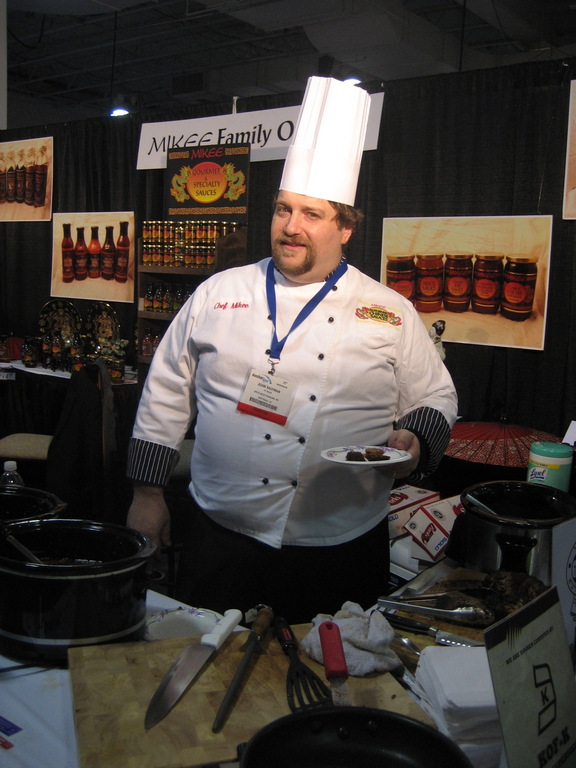Kosherfest 2008
Long Island vendors take top honors
By Lisa Schiffman
Issue of Nov. 21, 2008 / 23 Cheshvan 5769
More than 6,000 exhibitors and visitors from 28 countries attended the kosher food trade show known as Kosherfest last week at The Meadowland’s Exposition Center in Secaucus, N.J. A handful of Long Island companies were recognized with special honors, including Simply Sushi Café, located in Gourmet Glatt in Cedarhurst, which beat out three well-known competitors for the bragging rights to ‘best kosher sushi.’
The winning platter was a collection of black dragon and red alert rolls, garnished with pepper tuna sashimi, which won top marks from the judges in every category.
Three other Long Island firms won prizes in the best new products competition.
Get Healthy America of Plainview, a gourmet diet food market and distributor, won in the “Best Health & Wellness” category for Gluten Free Penne Pasta with Meat Sauce.
The Kosher Cook in Cedarhurst, owned by Gitelle Steinfeld and Ilana Moskowitz, took first prize in The Best Giftware/ Novelty Category for their new line of holiday bake ware.
Woodmere-based Shabtai Gourmet won in the “Best New Passover Product” category for Gluten Free “Brownie Bites from their Cinderella Sweets line.
“We needed a snack for children [with special dietary needs] to take to school that was gluten, casein and lactose free,” proprietor Cindy Fern Itzkowitz told The Jewish Star. Shabtai Gourmet has won the same category four times in the last seven years –– last year for an almond and sugar confection called “Marzipan Sushi.”
Zelda’s Sweet Shoppe of Skokie, IL. won “Best in Show” for their Southern Pecan Pie.
This was the 20th anniversary of the show celebrating the multi-billion-dollar kosher food industry. Its creator, Menachem Lubinsky, who sold Kosherfest to Diversified Business Communications several years ago, still played the role of impresario, noting that, “A walk through Kosherfest will include seeing Asian kosher, gluten-free kosher, sugar-free kosher, gourmet kosher, Italian kosher, Mediterranean kosher and more.”
More than 300 new kosher products swere introduced at Kosherfest –– many by entrepreneurs seeking distribution deals from the handful of giant kosher food companies who dominated the show, including Manischewitz, Kedem and Osem.
“Some kosher products have no equal in the non-kosher market, making them attractive to almost every shopper that walks into a supermarket,” Lubinsky said. Improved packaging makes kosher products attractive not only to traditional consumers, but to non-traditional –– read: not Jewish –– ones who shop in the kosher aisles, he added.
According to Lubinsky, whose firm, LUBICOM, tracks the kosher industry, an estimated 11.5 million Americans buy $12.5 billion of kosher foods annually. Those figures reflect both Jewish consumers and non-Jewish ones who perceive kosher products as being of better quality because of religious reasons or due to dietary and taste preferences. Kosher product sales have increased by 10 to 15 percent each year in the last eight years, he said.
Many new products showcased were geared towards the health-conscious consumer. “Everyone is looking for a healthy lifestyle diet,” DPI Specialty Foods’ Joe Plueger told The Jewish Star. Plueger is responsible for supplying the kosher food aisles of major supermarket chains in the Midwest.
At The Manischewitz Company booth, Passover Tam Tams were displayed in sleek new packaging, as was a line of all-natural, no MSG, ready-to-eat Beef and Chicken broths to be launched in local supermarkets this spring.
At MIKEE Exotic Sauce Packaging, Vice President of Sales Adam Kaufman, decked out in chef’s whites and hat, busily sliced brisket cooked in their newest product, New York Style Old Fashioned Brisket Cooking Sauce. “With this product, you can make a real brisket every time — perfect!” he assured visitors.
At a seminar on what’s new and hot in kosher cooking, Jeff Nathan, acclaimed chef, cookbook author and restaurateur, discussed how mainstream non-kosher trends, such as the national craze for South American and Asian cuisine, has impacted on the kosher food industry.
“Once it happens in non-kosher it will happen in kosher,” he explained. “Ethnicity is really hot –– the sub regions of Asia are the hottest category. Ten years ago, you couldn’t get kosher rice wine vinegar. Since then, the kosher consumer has become more sophisticated. Now there isn’t a Jew on the planet who doesn’t know what sushi is.”
A number of exotic new sauces on display reflected this trend. One intriguing example: Israeli company Oriental Food Importers Co. LTD.’s Healthy Boy Brand of Red, Green and Yellow curry sauces. These sauces, intended to fill a niche in the kosher Asian segment, replicate the authentic flavors of traditional Thai cooking.

 48.0°,
Light Drizzle Fog/Mist
48.0°,
Light Drizzle Fog/Mist 




